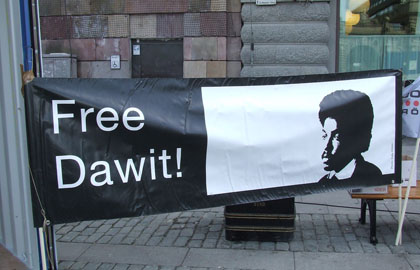Journalist Dawit Isaac, co-founder of Eritrea’s now-defunct leading newspaper Setit, has spent nearly 10 years in one of the reclusive Red Sea nation’s secret prisons with no charges ever placed against him. Isaac’s location and health status are currently unknown, as are those of at least 16 other journalists who CPJ believes are also being held incommunicado in the country.
Unlike the 16 other journalists, however, Isaac–who was briefly freed in October 2005–has double citizenship. In his second homeland, Sweden, his brother, Esayas Isaac, has run a tireless campaign to free him. Last month, Esayas joined forces with three jurists–Jesús Alcalá, Prisca Orsonneau, and Percy Bratt–and filed a writ of habeas corpus with Eritrea’s Supreme Court calling for information on the journalist’s whereabouts and a review of his detention.
Esayas Isaac sees the habeas corpus as one of his last options since his brother has long suffered from a diabetic condition that requires medical supervision. “Eritrean law accepts this type of writ, so I feel that we must try in every way possible to free Dawit,” he told me.
A 70-page legal document clearly lists how Isaac’s incommunicado detention is in violation of Eritrea’s penal code and constitution as well as a number of international laws, including the African Declaration on Human and People’s Rights and the International Covenant on Civil and Political Rights. All prisoners have the right to access a habeas corpus court order, according to Eritrean law. Roughly 20 editors-in-chief of major European newspapers have signed an amicus brief supporting the writ for habeas corpus including El País, Frankfurter Rundschau, Spiegel Online, Gazeta Wyborcza, Expressen, Aftenposten, and Berlingske, among others.
Curiously, the Swedish government, which has always adhered to quiet diplomacy, has not supported the writ of habeas corpus. Foreign Minister Carl Bildt said the country’s goal was to have Isaac released on humanitarian grounds rather than stand trial, according to local reports, while Prime Minister Fredrik Reinfeldt said that Isaac’s dual citizenship with Sweden and Eritrea made negotiations difficult, but did not elaborate. “Their statements have been vague and rather counterintuitive,” Björn Tunbäck, a key organizer of the habeas corpus writ and Swedish representative of Reporters Without Borders, told me.
Esayas Isaac wrote an open letter to the European Union and Swedish governments last year expressing his concern that they were not applying enough pressure on the Eritrean government. Reinfeldt certainly has not allayed any concerns given that he conceded in a 2009 interview on private Swedish television station Expressen TV that it was “almost impossible to free Dawit.” Esayas said, “It sounded as if he had already given up, and that gives the Eritrean government more encouragement.”
In a country shrouded in secrecy, as Eritrea is, it is never easy to know whether a quiet diplomacy or more aggressive approach is the most effective. British authorities managed to release four Britons detained by Eritrea on spying charges in less than six months this year. The reasons for their release may never be known, but a directive by British Foreign Secretary William Hague ordering U.K. ambassadors around the world to raise concerns with their Eritrean counterparts, and other measures such as blocking an export tax required by Eritrean citizens living abroad and limiting movement of Eritrean diplomats in the U.K. may have helped.
“If the Swedish government thinks that silent diplomacy is the answer, then please continue,” Esayas Isaac said. “But given the amount of time he has been in jail, they must try more options [and be] more tough on the Eritrean government.”
Dawit Isaac’s release is imperative to his survival. In April 2010, Eyob Bhata Habtemariam, an Eritrean defector who claimed to have been a guard in Eritrea’s remote maximum-security Eiraeiro Prison, told reporters that the journalist was languishing in poor physical and mental health. No torture is necessary in the 122 degrees Fahrenheit (50 degrees Celsius) prison, Habtemariam told Al-Jazeera, since the conditions within the prison are torture in itself and the prisoners “are there to die.”
The United Nations, the Red Cross, and other relief organizations fear the drought conditions in neighboring Ethiopia and Somalia may also be affecting Eritrea. But senior Eritrean presidential adviser Yemani Gebreab has flatly denied this, while aid agencies complain of an information black hole, according to reports. With the absence of any independent press in Eritrea, the truth may never be revealed about conditions for the country’s citizens, and the journalists who are hidden in its prisons, until it is too late.
